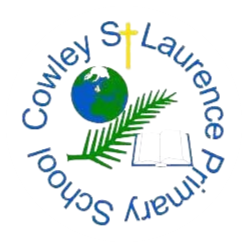
Reading
Reading Vision
At Cowley St Laurence CE Primary School we believe that reading is a crucial part of every child’s education which underpins their journey through our curriculum. We believe that no child should be left behind and use a range of strategies to support all children to succeed and flourish.
We aim to ‘hook’ children into books so that reading is an enjoyable and pleasurable activity through which they develop a life-long love and become confident, fluent readers which contributes to their educational achievement across the curriculum and success beyond their school life.
We strive to provide pupils with a rich and varied learning experience in which they access high quality texts across a range of genres so that they have the breadth of experience to develop their own personal preferences and a pleasure for reading.
What does a good reader look like? |
|||
|
End of EYFS |
End of KS1 |
End of Upper KS2 |
|
|
Children can use their phonics knowledge to read books with confidence and are building fluency.
Children can talk about the text, re-telling a story, naming key events, describing characters, using some new vocabulary learnt.
Children enjoy listening to stories, rhymes, poems and other text.
Children attempt to read text in the environment using their sight/ phonics knowledge.
Children talk about their favourite books giving reasons why they enjoy these texts.
|
Children read most words accurately without overt sounding and blending with growing intonation.
Children read fluently (approx. 90 words per min) which allows them to focus on their understanding of the text.
Children check what they are reading makes sense to them, correcting any inaccurate reading
Children can answer questions about what they’ve read and make some inferences
Children can explain what has happened so far in what they have read and make a plausible prediction.
Children are starting to make links between the wide range of texts that they read across the curriculum.
|
Children can identify, summarize and paraphrase the main ideas of a text
Children can justify their opinions when discussing a wide range of text and can express views and preferences on genre, author, poet, taking part in discussions and sharing recommendations.
Children enquiry about their reading, asking themselves questions about a text to improve their understanding and/or to find out more to extend their knowledge.
Children can draw on their experience of similar text to predict what might happen text.
Children can infer, explaining their thinking routinely returning to text to explain their thinking.
Children can evaluate the writer’s use of language and structure of the text and its impact on the reader.
Children can evaluate the accuracy and reliability of the information they read.
Children can read aloud for different purposes and audiences. |
|
How is this achieved? |
|
|
Assessment |
Rigorous assessment at all points of a child’s journey ensures they are reading books with appropriate challenge and that lessons are matched to their needs. |
|
Synthetic Phonics |
Read, Write, Inc is taught to all children in EYFS and KS1 to give them a secure grounding in phonics. 1:1 catch up and Fresh Start programmes are used across the school to ensure that no child is left behind. |
|
Whole Class texts |
Aspirational texts have been carefully chosen to cover a wide range of genres and in most cases to develop children’s understanding of the wider curriculum themes. |
|
Comprehension |
Comprehension is developed through the use of high quality texts and focused book talk in EYFS and Year 1. This is further developed from Y2, through more formal READ lessons and daily whole class reading. A strong focus is placed on EAD questions (explore, analyze, deduct and infer) to ensure that children’s thinking is challenged and they gain a deeper understanding of the high quality texts that are read. |
|
Exploration |
Lessons are linked to the whole class text, where appropriate, to allow children to immerse themselves in the style of the genre. Children are given the opportunity to explore learning themes further through personal reading using school library texts, digital research and other reading materials. |
|
Home-school reading |
A clear strategy supports children to read regularly outside of school. The expectation is that an adult reads with a child 1:1 every week. |
|
Reading to writing |
Writing lessons link to the curriculum theme a wide range of genres are used to enrich and provide a stimulus for their own writing. |
|
Enjoyment |
Our love of reading and story-telling is shared not only through the range of books that children read across the curriculum but through worship, class discussion, themed book/author emersion days and weeks, peer story time, book club and recommend book of the week. |
Parent Information Video: Read Write Inc
Read, Write, Inc: An Overview
Read Write Inc: How to say the sounds
Learn more about Read, Write, Inc here: